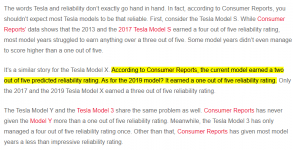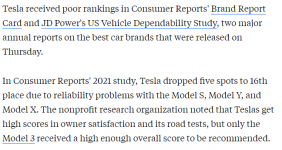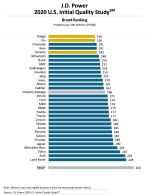Now you're starting to get it. Fortunately there's a path forward for you as well. First, you need to set aside the irrational Elon Musk hate and just evaluate the products which are not the result of one person who gives you a tummy ache, but thousands of smart, experienced engineers working day-in and day-out to create a good product they are proud of. Or, keep up the Hate but compartmentalize it from the product. This will be hard but I think you can do it. Second, you need to zoom out from Tesla altogether and start understanding how ADAS systems work, and read a book on safety-rated software development. This will help you better assess how this field of software development compares to the potentially-less-robust one you're familiar with. Third and finally, you should get some experience with long-term ownership of cars to understand the difference between initial and long-term reliability, as well as the difference between predicted and actual reliability. This will give you a well-rounded base of information to evaluate this emerging field.
If you hit me up on PM I'd be happy to suggest some good books.
My dislike of Musk is not irrational at all, no more so than my dislike of Trump, there are reasons, many of them and they are well known and in the public domain, there are often very rational reasons for disliking people.
The facts are the facts, the reliability data is what it is. Clearly you want to dismiss it and explain to me how all these industry and engineering press don't understand what reliability means but of course
you do, but that's rather a tall order I'm afraid, I'd need a bit more data beside your opinions and assurances.
Software is software is software and inherently struggles with bugs of all types ranging from ambiguous specifications, insufficient testing, hardware reliability, noise, transients, version mismatches, bugs in compilers and operating systems, bugs stemming from poorly implemented concurrency, bugs in hardware even (FPGAs) and so on.
Yes one can take steps to
improve in all these areas but it is subject to the well known law of diminishing returns.
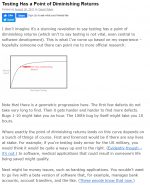
and
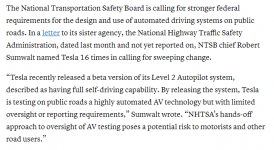
What does "beta" actually mean in the world of software? here's one definition:
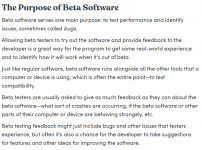
So there we have it beta builds exist to "test performance and identify bugs", Tesla can't afford or don't have the resources to test the software to the high standards of robustness and safety you allude to, so instead trickle it out the loyal customers and let them do the donkey work, sure one or two might die but hey, this is the brave new world.

